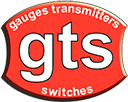FREE EXPRESS AIRBAG SHIPPING ON ORDERS OVER $40!
GTS stocks a large range of pressure gauges including supporting accessories in Australia. Our range of pressure gauges starts from vacuum gauges for negative pressure to compound gauges for both negative and positive pressure. Built from high-quality stainless steel, our pressure gauges provide accurate readings and can withstand tough environments. Available in 63mm to 100mm gauges sizes, we offer standard and digital gauges to best suit your application requirements and are available for the bottom and rear entry. Whether you're looking for an oil pressure gauge or an air pressure gauge we have you covered.
These pressure gauges can measure up to 15000 psi or 1000 bar and are ideal for a wide range of uses across different industries. Our supporting accessories for pressure gauges include pointers, rubber protection shrouds, adapters, snubbers dials and more. Check out our product catalogue today for a full range of details and specifications, or get in touch with the team at GTS for more information.
Q: What is a pressure gauge used for?
As the name suggests, a pressure gauge is an instrument used to measure and display the amount of force of a liquid or gas applied on a unit area. They are essential for monitoring fluid or air pressure in pressure applications. Pressure gauges support hydraulic systems by monitoring leakages or any pressure changes that could affect operating conditions.
Q: How do pressure gauges measure pressure?
Very low pressures are measured using a Capsule Gauge. A capsule gauge uses a diaphragm to measure the very low pressures. Very High Pressures are measured by a helicoil pressure gauge, like a standard Bourdon tube gauge uses a helically coiled or spiral-shaped Bourdon tube to measure pressure.
Q: What are the different types of pressure gauges?
At GTS our range of pressure gauges extend to;
Mechanical pressure gauges – The most common type available
Digital pressure gauges – Electronic signal, higher accuracy
Capsule pressure gauges – Low pressures
Vacuum gauges – Negative pressure (suction)
Compound pressure gauges – Negative + positive pressure displayed on the dial
Q: What options are available for my pressure gauge?
Application – The environment in which the gauge will be used. Some of the more popular applications include oil pressure gauges, water pressure gauges and air pressure gauges.
Pressure range/scales – kPa, bar, psi,
Size – The dial sizes range from 40mm up to 160mm
Material – Pressure Gauges are available with brass parts or all stainless steel. Certain applications or environments may require non-corrosive metal so it should be considered when choosing your material type.
Connection type - Bottom or rear connection entry
Thread type and size – The most common thread types are BSPT, BSPP and NPT, available in 3/8”,1/4” or 1/2” size.
Glycerine filling option – If your application environment involves high pressure, glycerine filling can dampen the moving parts to ensure precise readability, and reduce wear and tear on your gauge.
Choosing the right options will help you get the perfect pressure gauge for your application at a reasonable cost and save you time when contacting us.
Q: What are some common applications of pressure gauges?
Pressure gauges are used in a wide range of industries and applications, including monitoring the air pressure in tires; measuring blood pressure; regulating pressure in pneumatic and hydraulic systems; monitoring pressure in refrigeration systems; and ensuring the safe operation of industrial machinery.
Q: How often should I calibrate a pressure gauge?
The regularity of how often you should calibrate your pressure gauge depends on the frequency at which the gauge is used and the level of accuracy required. Some companies re-certify/recalibrate their gauges every 6 months, however, every 12 months is the industry standard
Q: My pressure gauge is not reading correctly, what can I do?
This could be due to a range of issues, including damage, incorrect calibration, or faulty installation. Contact GTS Gauges, and we will assist you.
Q: Why should I choose a stainless steel pressure gauge over a brass/copper alloy gauge?
Stainless steel is a perfect solution for corrosive environments such as saltwater, steam and certain chemicals, and for applications in harsh or corrosive environments. They are also able to handle higer temperatures than brass.
